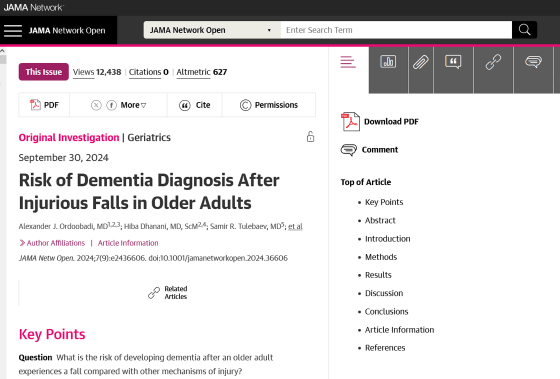Elderly people who fall and injure themselves are at higher risk of developing dementia within a year

Falls are the most common cause of injury for older adults, and
Risk of Dementia Diagnosis After Injurious Falls in Older Adults | Geriatrics | JAMA Network Open | JAMA Network
https://jamanetwork.com/journals/jamanetworkopen/fullarticle/2824208

BWH Press Release - Brigham and Women's Hospital
https://www.brighamandwomens.org/about-bwh/newsroom/press-releases-detail?id=4814
Shockingly Common Injury Linked With an Increased Risk of Dementia : ScienceAlert
https://www.sciencealert.com/shockingly-common-injury-linked-with-an-increased-risk-of-dementia
Because motor decline is one of the signs of cognitive decline, injuries from falls may be associated with the risk of developing dementia in older adults, but to date, cognitive health has not been taken into account in detail in fall prevention guidelines.
A research team at Brigham and Women's Hospital in the United States analyzed data from 2,453,655 elderly people aged 65 or older who used the public health insurance system Medicare for injuries between 2014 and 2015, as well as follow-up data for one year after the injury.
After excluding patients who had already been diagnosed with dementia, the research team classified patients into 'elderly people who were injured by falls' and 'elderly people who were injured by factors other than falls' and compared the proportion of those who were diagnosed with dementia within one year of injury.

The analysis revealed that about half of the patients had been injured by falls, and that elderly people who had been injured by falls were more than 20% more likely to develop dementia within one year of the injury than those who had not.
In the figure below, the vertical axis shows the cumulative number of dementia diagnoses, and the horizontal axis shows the number of days since the injury. The solid black line shows elderly people who were injured by falls, and the dashed orange line shows elderly people who were injured by factors other than falls.

'The relationship between falls and dementia appears to be bidirectional,' said Dr.
Although the results of this study only show an association between falls and dementia, they do not prove a direct causal relationship. Still, German said, 'Falls may serve as a precursor event to help identify people who need further cognitive screening,' emphasizing the importance of early intervention for older adults who fall.

Related Posts:
in Science, Posted by log1h_ik







